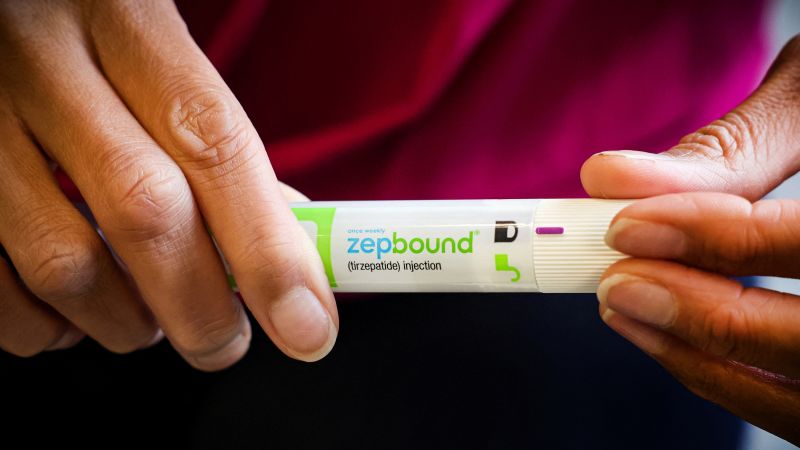On a significant Friday, the US Food and Drug Administration (FDA) approved Zepbound, marking it as the first prescription medication specifically aimed at treating obstructive sleep apnea (OSA), which particularly affects individuals grappling with obesity. This groundbreaking drug, classified under the GLP-1 receptor agonists family—alongside well-known medications like Ozempic—is designed for patients suffering from moderate to severe manifestations of OSA. Eli Lilly, the pharmaceutical company behind Zepbound, highlighted that its use should be accompanied by a balanced, reduced-calorie diet and enhanced physical activity to achieve the best results.
The announcement was met with enthusiasm from health officials, including Dr. Sally Seymour, the director of the FDA’s Division of Pulmonology, Allergy, and Critical Care, who referred to this approval as a “major step forward for patients with obstructive sleep apnea.” OSA, which impacts nearly 30 million individuals across the United States, poses a significant health risk as it is closely linked with obesity. The American Academy of Sleep Medicine notes that significant weight loss can greatly mitigate the symptoms and severity of this condition. OSA is defined by periodic interruptions in breathing during sleep due to blockages in airflow, consequently escalating risks associated with heart and brain health.
Patrik Jonsson, president of Lilly’s Cardiometabolic Health division, emphasized that there are many instances of OSA that remain unrecognized, leaving numerous individuals vulnerable to critical health complications. Symptoms commonly associated with this disorder include loud snoring, choking, or gasping during sleep, along with excessive daytime sleepiness. In clinical trials conducted by Lilly, nearly half of the participants demonstrated sufficient improvements in their conditions that they no longer exhibited symptoms associated with OSA.
Importantly, this approval for Zepbound represents the second indication for the drug, which had earlier received FDA clearance for weight loss in patients who are either obese or overweight with accompanying weight-related health concerns back in November 2023. While the approval for sleep apnea does not broaden the criteria for who can take the medication, it could initiate insurance coverage possibilities for patients under Medicare—a healthcare program that currently does not compensate for drugs solely focusing on weight loss.
The financial implications of the Zepbound treatment are notable. Without insurance coverage, the monthly cost for the medication is approximately $1,060. However, Eli Lilly provides financial assistance options, including discounts and lower-cost alternatives. These alternatives may necessitate syringe use instead of the more user-friendly auto-injector pens, but nonetheless, the out-of-pocket expenses can still accumulate into hundreds of dollars monthly.
In relation to Medicare, the Biden administration floated a proposal in November to adjust coverage policies regarding obesity medications. Presently, beneficiaries are eligible for insurance coverage for weight-loss drugs primarily when they are prescribed for additional indications, such as mitigating heart-related risks. This aspect underscores ongoing debates regarding the accessibility and affordability of treatments for obesity-related conditions, including OSA.
The data supporting the FDA’s latest approval stemmed from two significant trials involving nearly 470 participants. One of these trials monitored patients using CPAP (continuous positive air pressure) machines, which are traditional treatments designed to maintain open airways during sleep. The findings revealed that treatment with Zepbound led to marked improvements across the studies, published with backing from the New England Journal of Medicine.
In detail, the trials aimed to enhance the apnea-hypopnea index (AHI), which measures the frequency of breathing disruptions per hour of sleep. Initial results indicated that participants faced about 50 incidents per hour on average, with a typical body mass index (BMI) around 39, a benchmark categorizing obesity as a BMI of 30 or greater.
Separately, within the trial framework where CPAP machines were not involved, Zepbound users exhibited a decline of roughly 25 events per hour in AHI after one year’s treatment, in contrast to a mere five for the placebo group. Meanwhile, the CPAP machine trial demonstrated similar improvements, with Zepbound participants seeing around 29 fewer interruptions compared to six in the placebo group.
Moreover, those administered Zepbound achieved impressive weight reductions, averaging between 18% to 20% of their body weight throughout the trials compared to minimal reductions of 1.6% to 2.3% among placebo participants. This significant loss translates to estimated weights lost between 45 to 50 pounds annually.
Beyond weight, patients on the drug experienced decreases in blood pressure and inflammation—critical risk factors associated with cardiovascular problems related to obstructive sleep apnea and obesity. While the studies revealed varied side effects—mostly gastrointestinal issues labeled as mild to moderate—they primarily occurred during initial treatment periods or during dose escalations, suggesting manageable challenges ahead for potential Zepbound users.
In summary, Zepbound’s FDA approval shines a spotlight on the critical intersection of obesity and obstructive sleep apnea, offering fresh hope for millions affected by these interlinked health challenges. As discussions around Medicare’s coverage evolve, the












